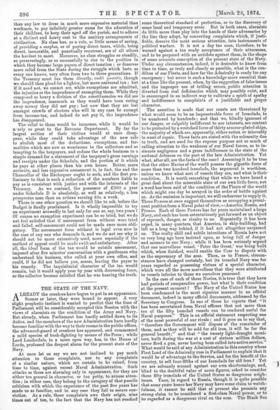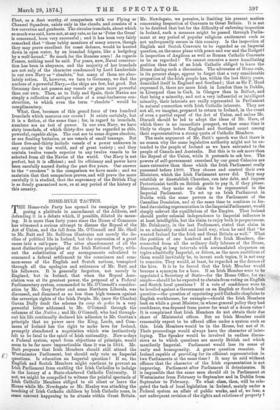views of alarmists on the condition of the Army and
Navy, ten of the fifty ironclad vessels can be rendered useful for But already, when Parliament has hardly settled down to its Naval purposes." This is an official statement respecting one duties, and the members of the new Administration have hardly of the most powerful of our rivals ; and it goes on to say that, become familiar with the way to their rooms in the public offices, "therefore the Government will dispose of the remainder of Lord Lauderdale, in a more open way, has, in the House of tors, built daring the war at a cost of sixteen million dollars, Lords, professed the deepest alarm for the present state of the never fired a gun, never having been called into active service." Navy. What would be said of any Administration in this country whose At once let us say we are not inclined to pay much First Lord of the Admiralty rose in Parliament to explain that it attention to these complaints, nor to any complaints would be of advantage to the Service, and for the benefit of the of a similar nature, which are certain to be raised, from country, to sell four-fifths of our Ironclads for old iron ? Yet time to time, against recent Naval Administration. Such we are solemnly warned against our own shortcomings, and, attacks as these are alarming only in appearance, for they are blind to the doubtful value of mere figures, asked to consider either too general in character, or too petty, to arouse atten- these fifty ironclads of the United States as dangerous neigh- tion ; in either case, they belong to the category of that puerile hours. Then, in regard to Russia, though it is quite possible criticism with which the experience of the past five years has that some years hence her Navy may have some claim to watch-
made us so familiar, and in any case they fail to secure con- fulness, it cannot be said that at present she presents any viction. As a rule, these complaints owe their origin, nine strong claim to be considered a first-class Naval power, or to times out of ten, to the fact that the Navy has not reached be regarded as a dangerous rival on the seas. The Black Sea than any law to dress in much more expensive material than some theoretical standard of perfection, or to the discovery of workmen, to pay infinitely greater sums for the education of some local and temporary error. But in both cases, alarmists their children, to keep their aged off the parish, and to adhere do little more than play into the hands of their adversaries by at a distinct and heavy cost to the sanitary arrangements of the line they adopt, by converting complaints which, if justi- civilisation. No class has, as a rule, so little means of saving, fiable, deserve the most serious attention, into instruments of of providing a surplus, or of paying direct taxes, which, being political warfare. It is not a day too soon, therefore, to be direct, inexorable, and punctually recurrent, are of all others warned against a too ready acceptance of their utterances, the hardest to meet. Moreover, no class struggles so steadily, and to be prepared with an antidote against them, in the shape so perseveringly, or so successfully to rise to the position in of some accurate conception of the present state of the Navy. which they become large payers of direct taxation ; or deserves Uhder any circumstances, indeed, it is desirable to know from more relief from the State during the struggle which lasts, as time to time, as truly and clearly as possible, what is the con- every one knows, very often from two to three generations. If diiton of our Fleets, and how far the Admiralty is ready for any the Treasury must tax them directly, cadit qua,stio, though emergency ; but never is such a knowledge more essential than we should then plead for a lighter, but more universal tax ; but at a time like the present, when, by the suggestion of false issues if it need not, we cannot see, while exemptions are admitted, and the improper use of trifling errors, public attention is the injustice or the imprudence of exempting them. While they diverted from real deficiencies which may possibly exist, and composed so heavy a division of the constituencies we did see is encouraged in an indirect way to cultivate a spirit of apathy the imprudence, inasmuch as they would have been voting and indifference to complaints of a justifiable and proper away money they did not pay ; but now that they are lost character.
amongst crowds of electors who will in any case be exempt The assertion is made that our coasts are threatened by from income-tax, and indeed do not pay it, the imprudence what would seem to be an impenetrable force of Ironclads, to has disappeared. be numbered by hundreds ; and that we, blindly ignorant of
The relief to them would be immense, while it would be our danger, or culpably indifferent to our interests, are content n 'arly as great to the Revenue Department. By far the to be protected by a wretched force of thirty armour-plated ships, largest section of their victims would at once disap- the majority of which are, apparently, either rotten or Miserably pear, while they could take advantage of the new rule in want of repair. These facts are stated with the solemnity due to abolish most of the deductions, exemptions, and for- to truth, and are used for the express purpose not so much of malities which are now so wearisome to the collectors and so calling attention to the weakness of our Naval forces, as to in- tempting to the taxpayers, and reduce the whole business to a sinuate negligence and a gross indifference to the state of the simple demand for a statement of the taxpayer's gross earnings national defences on the part of the late Administration. Yet and receipts under the Schedule, and the portion of it which what, after all, are the facts of the case? Assuming it to be true he pays at other places than his own house. Better, more that the other Navies of the world possess the gigantic force of accurate, and less expensive assessment is, in fact, the end the more than two hundred ironclads, the argument is worthless, Chancellor of the Exchequer ought to seek, and the first pre- unless we know what sort of vessels they are, and what is their liminary to that is such a reduction of the numbers liable to condition. It is worth remarking that while we have heard a pay as is consistent with justice and with the interests of the great deal about the miserable state of our own little force, not Treasury. As we contend, the possessor of £300 a year a word has been said of the condition of the Fleets of the world under Schedule D is absolutely, as well as relatively, a less which might one day be arrayed in the order of battle against
prosperous man than an artisan earning 40s. a week. us. As the omission is important, we will endeavour to supply it.
There is one other question we should like to ask, before the Three Powers at once suggest themselves as occupying a promi- Budget is finally proclaimed. Is it wholly impossible to try nent position from a Naval point of view,—America, Russia, and an experiment avowedly to last only for one or, say, two years ? France. Each of these Powers has for years maintained a large Of course no exemption experiment can be so tried, but we do Navy, and each has been ostentatiously put forward as an object not feel satisfied that if assessment from without were tried of reproach, danger, or rivalry to us. Repeatedly it has been In the case of each of these Navies, it is true that they have had periods of comparative power, but what is their condition THE STATE OF THE NAVY. at the present moment ? The Navy of the United States has Fleet, as a fleet worthy. of comparison with our Flying or Channel Squadron, exists only in the clouds, and consists of a few corvettes and gunboats. The circular ironclads, about which so much was said, have not, at any rate, so far as 'Peter the Great' is concerned, been very successful ; and it has been very fairly remarked that "these tubby monitors of many screws, though they may prove excellent for coast defence, would be hunted down in open water, by an ironclad frigate, like a hedgehog by a wolf-hound." So much for the Russian scare! As regards France, nothing need be said. For years, now, Naval construc- tion has been in abeyance, and the majority of her ironclads are not only of the character condemned by Lord Lauderdale in our own Navy as "obsolete," but many of them are abso- lutely rotten. If, however, we turn to Germany, we find the nucleus of a powerful Navy,—the ships are few, but good. But Germany does not possess any vessels or guns more powerful than our own. Then, as to Italy and Spain, their Navies are simply a collection of antique relics of a semi-barbarous con- struction, to which even the term " obsolete " would be complimentary. What, then, becomes of this grand force of two hundred Ironclads which menaces our coasts ? It exists certainly, but it is a fiction, at the same time ; for, in regard to ironclads, numbers are no test of power. In our own Navy, we have sixty ironclads, of which thirty-five may be regarded as able, powerful, capable ships. The rest are to some degree obsolete, or are floating batteries, or are vetsels of small tonnage. But these five-and-thirty include vessels of a power unknown in any country in the world, and of great variety ; and they contain twelve vessels superior to any twelve vessels to be selected from all the Navies of the world. Our Navy is not perfect, but it is efficient ; and its efficiency and power have been carefully nursed during the past five years. Our answer to the " croakers " is the comparison we have made ; and we maintain that that comparison proves, and will prove the more carefully it is studied, that the supremacy of the British Flag is as firmly guaranteed now, as at any period of the history of this country.



































 Previous page
Previous page